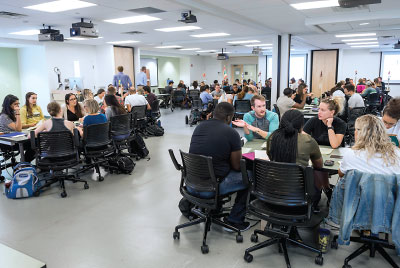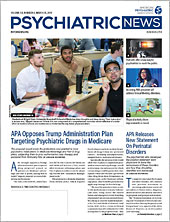Mark Crager and Fatima Bensabeur, second-year students at Wright State University Boonshoft School of Medicine (BSOM) in Dayton, Ohio, are learning medicine along with their fellow students at BSOM in a fashion that perhaps no American physician in preceding generations ever has.
Consider the class “Host and Defense,” an introduction to the principles of immunology, bacteriology, and virology as they apply to human disease. Crager and his classmates are expected to read texts ahead of time—like the dense, foundational Robbins’ Pathologic Basis of Disease—with only a study guide to help students focus on the core material.
Then, rather than sitting through a lecture, reading notes, and regurgitating information in a test, Crager, Bensabeur, and their peers work with each other to discern what is relevant in the material in one of BSOM’s “flipped classroom” formats, such as Peer Instruction (or PI). They are quizzed on the core material using electronic devices for recording their answers; if 80 percent of the class answer correctly, they move on. If less than 80 percent answer correctly, the students and faculty discuss, using problem-solving and critical-thinking skills to arrive at a common understanding.
“In PI, all of the students bring their unique background to the subject matter,” Crager said. “Any one of your peers can explain something in a way that makes it very clear. In this way, the material takes on a new meaning—it’s not just this massive textbook. You might come into it feeling overwhelmed, but when you sit down with your peers and work it through, you get a vision of what’s really important.”
Similarly, Bensabeur recalled a first-year pharmacology session in which she and her peers were given a lengthy list of drug names. As for Crager and his pathology text, it was up to Bensabeur to research how the drugs worked and what they treated, then join her fellow students in PI and refine her knowledge.
“I vividly remember my heart rate going up as anxiety started to set in,” she told Psychiatric News. “I was given only the drug names and nothing else. I immediately started looking up ways that other students use to memorize drugs online and decided to go with flashcards. One day I would need to use this very information to save someone’s life, so the better I learn it, the better physician I will be. I felt empowered. I was not told what to do or where to look. I was treated as a future physician who needed to make her own decisions. That’s why our program is different.”
Educators Seek to Modernize Medical Education
Crager’s and Bensabeur’s novel learning experiences are components of the WrightCurriculum, an innovative educational model that was five years in the making before being rolled out at BSOM in 2017.
Psychiatrist Brenda Roman, M.D., associate dean for medical education at BSOM, said that the curriculum is based on state-of-the-art “science of learning.” (Peer instruction, for instance, was developed by Eric Mazur, Ph.D., a Harvard physics professor dissatisfied with the traditional model of “read, lecture, memorize, regurgitate.”)
Roman said that she believes the curriculum is the first in the nation to be entirely without lectures. “We expect students to read the material prior to class and come to class sessions to solve problems and think critically about the content that they should have already learned,” she told Psychiatric News.
Teaching by the faculty becomes focused on probing for deeper understanding and clarifying misconceptions, and classroom time is intended to be highly interactive. “It results in a much richer conversation than typically happens during a lecture. The science of learning has taught us that learning from lectures is in fact highly inefficient. People retain only 5 to 10 percent of what they are told.”
Rather, she said, evidence from cognitive psychology has shown that people learn best through “retrieval-based learning.” “Every time you are forced to retrieve something from your brain, you strengthen the neural connections associated with memory, so that the next time you are expected to retrieve it, it should be easier.”
Other innovative aspects of learning at Wright include an “interleaved” curriculum in which disparate topics (say, anatomy and the pathophysiology of a particular disorder) are woven together, switched between, and revisited at intervals throughout the year. Another is “distributed practice” in which learning about a particular topic or aspect of medical practice is spaced out over time. Both of these replace the traditional method of block learning, in which students cover one topic at a time, and the time-honored practice of “cramming” to memorize blocks of material—now regarded by cognitive scientists as an especially bad way to retain information.
WrightQ is the school’s version of “problem-based learning,” in which a clinical case is discussed in small groups with a faculty facilitator. Students develop their own objectives for the case, research those objectives, and then present to each other a week later. “This form of learning requires that the students research the literature to find evidence-based treatments,” Roman said.
Multiple-choice exams throughout a course are taken by students individually, followed by students working in the team-based learning groups and taking the same exam again. “We use scratch-off cards—kind of like lottery cards—in which students, after discussion, scratch off as a team what they feel the best answer is,” Roman said. “If they don’t get it the first time, they try again, receiving partial credit for a correct answer.”
The innovations at BSOM are part of a trend in which traditional medical learning—based largely on an educational model more than a century old—is being reexamined. “The reforms at Wright State BSOM are reflective of a wider movement across medical schools and residencies to modernize the way doctors are trained,” said APA Director of Education Tristan Gorrindo, M.D. “Cognitive science is informing the way we approach learning throughout higher education. This kind of innovation is exciting, and the continued study of these approaches will help us understand the impact of this learning on the wards and in residency.”
WrightCurriculum will be refined over time, and the students and educators at Wright are “learning about learning” as they go. “We are the first class to experience this new model of medical education,” said Crager. “There have been some challenges, but the nice thing is that the administration and faculty are recognizing the challenges as they come up and are willing to make adjustments. Within five years, the program should be streamlined, and they will have a good sense of what really maximizes learning.”
Certainly, the medical education that Crager and Bensabeur are experiencing is a departure. Said Roman, “This is a very different experience from the one with which practicing physicians today are familiar.” ■
Information about the WrightCurriculum can be accessed
here.


